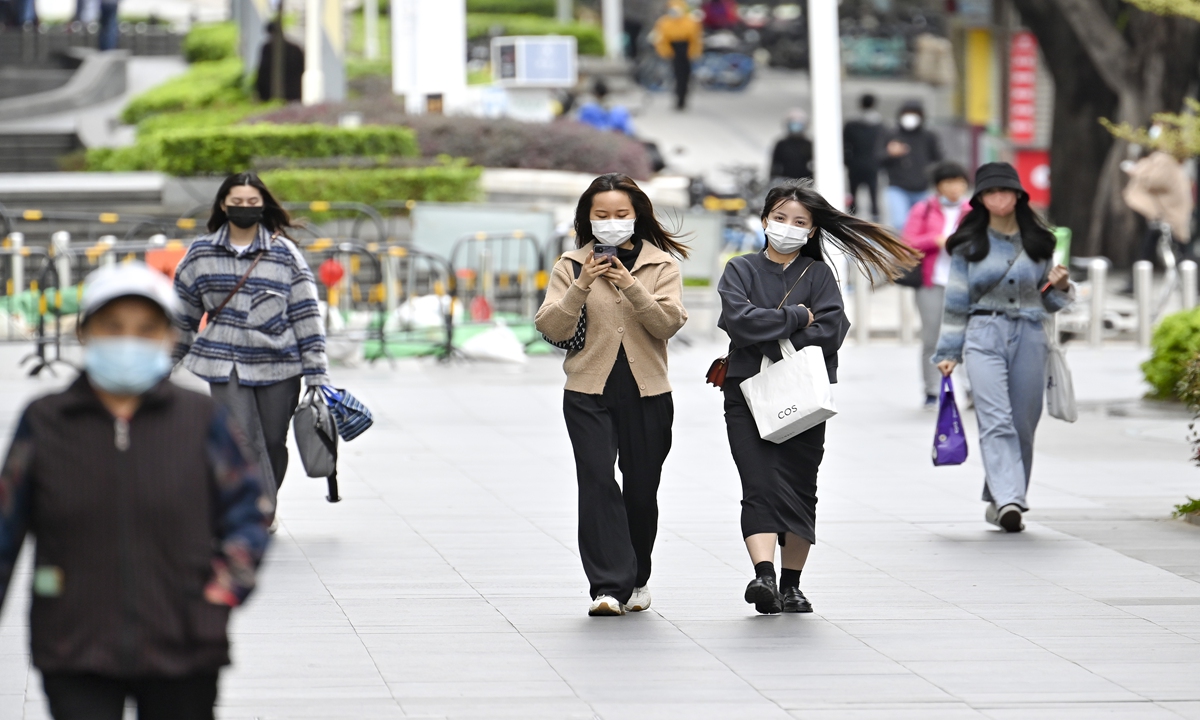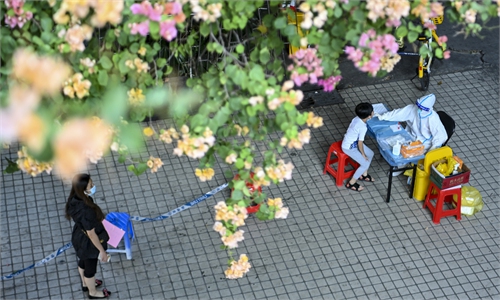Guangzhou strengthens medical capability to address severe cases, prepares for predicted peak in January

Residents wearing face masks on a street in Guangzhou in South China’s Guangdong Province on Thursday. Several districts in Guangzhou have lifted temporary restrictions. Photo: VCG
Guangzhou in South China’s Guangdong Province is strengthening its medical resource reserves, improving medical capability in an all-round way including increasing the number of ICU beds from 455 to 1,385, to prepare for a predicted epidemic peak in early January in 2023, a local health official said on Monday.
Since December, the number of fever outpatient visits in Guangzhou has continued to rise, and has remained at a high level for nearly a week. The majority of patients have been adults aged 18 to 59, accounting for 86 percent of the total, while the population aged 60 and above accounted for 8.2 percent, with individuals under the age of 18 accounting for 5.8 percent, Zhang Yi, deputy director of the municipal health commission of Guangzhou said at a Monday press briefing.
The city has carried out six major measures including increasing fever outpatient services and intensive care unit (ICU) beds, pushing forward internet hospitals, deploying medical personnel and medical supplies in a targeted manner, and strengthening medical services for key population groups and rural areas, according to Zhang.
About 50,000 people each day have received fever outpatient services in the city. There were originally 114 fever outpatient clinics and 179 fever consulting rooms in Guangzhou, with a total of 475 fever diagnosis rooms, with a daily capacity of about 40,000 visits. Daily capacity has recently been raised to receive 111,000 visits with the number of fever diagnosis rooms reaching 1,048, Zhang said.
From December 1 to 15, a total of 5,979 patients were sent to designated hospitals in the city, and 3,792 have been discharged. Guangzhou currently has seven designated hospitals and four sub-designated hospitals, with a total of 6,880 beds including 455 ICU beds, Zhang said.
The city has invested 895 million yuan ($128.35 million) and purchased 22,000 units of medical equipment. “It is expected that the number of ICU beds will increase from 455 to 1,385 on Tuesday, to fully prepare for the possible arrival of peak infection levels,” Zhang said.
Since December 6, internet hospitals have provided online diagnosis and treatment covering 140,000 visits, 28,600 health consultations, and issued 42,000 electronic prescriptions.
Due to the recent shortage of antipyretic drugs, the city vowed to work closely with all departments to ensure drug use in pharmacies of medical institutions. Guangzhou has fully improved its database of key groups to ensure that the number of key groups and their health situation is accurate.
Meanwhile, the city has strengthened the medical health education and opened consulting hotlines to provide daily health consultation and basic medical services.



